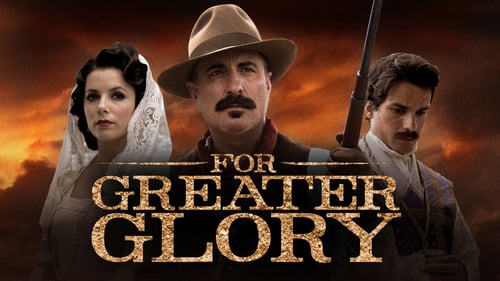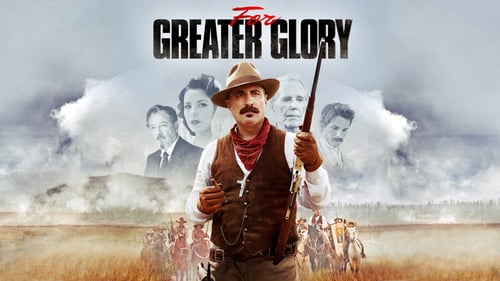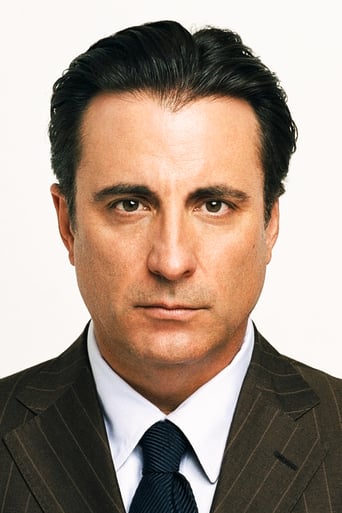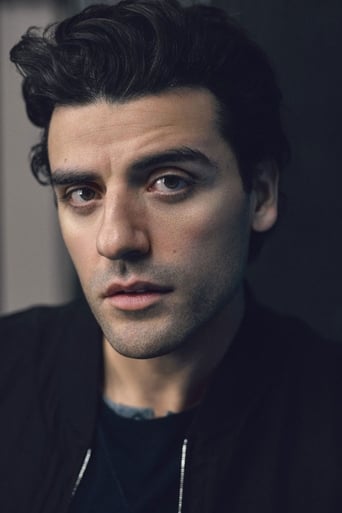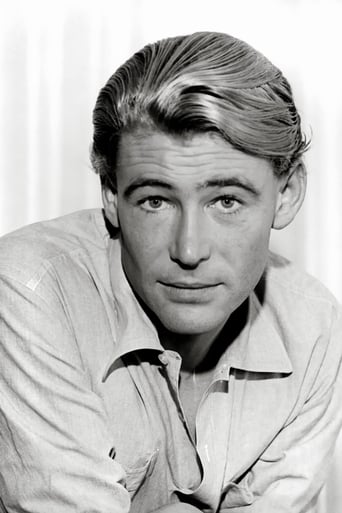Marcin Kukuczka
What strikes me most about Dean Wright's directorial debut are the ever present contradictions. 'For greater glory' naturally brings to mind brave warriors, glorified figures of history and that certain aura achieved through cinematic means. Surely, one would expect those characters to be so noble, so brave, so unique whose more earthly cry "FREEDOM" brings our tensed emotions to climactic crescendo. However, the assumption proves wrong as the characters offer us a more profound cry of their cause filled with piety and evangelical radicalism: "Long live Christ the King!" Is it the ideal that humans are ready to live for, fight for and die for? Perhaps in the first century persecutions but in the 20th century after the death of God had been acclaimed? Isn't that a historical irony but also a historic moment when we view this film based on THE CRISTERO REBELLION by a historian Jean Meyer? While considering reviews, one could draw an intriguing conclusion: film scholars seem to like its artistic aspects, its scale of undertaking but never make any particular indication of their straightforward enthusiasm towards its explicit religious references. Among highly positive remarks, Stephen Holden of the New York Times regards the film's grandeur as "impressively spacious" comparing this Mexican production to Hollywood's greatest epics; Phil Boatwright refers to the film as "homage to religious freedom." And yet, film scholars also appear to be in contradictions to one another. Among less positive reviews, Roger Ebert criticizes the movie as having too strong "pro-Catholic tunnel vision;" and Lauren Markoe of Religion News Service observes its "battle to preserve religious freedom." Yet, Steven D. Greydanus, addressing various aspects, especially its theme "far too little known" calls CRISTIADA "the right movie at the right time." Is it reasonable, though, to be politically incorrect and let oneself follow the footsteps of 'straightforward' enthusiasts? Along with its solid production, great cinematography, overwhelming shots in Mexico's beauties, including Tlaxcala, Puebla and haunting score by James Horner hailed by Stephen Holden as "uplifting without being syrupy," Dean Wright's film is a truly epic scale production. But what may strike a more subtle viewer most is its explicit profoundity. I allow myself for that contradictory phrase because it seems to resemble the core idea of the director's point. This strength lies in its characters. CRISTIADA manages to capture spirituality within the very concrete medium that cinema is, reflects Christian motifs and displays them explicitly in order to affect diverse audiences.Actually, this very point is best resembled in the opening words...somewhere in between 'poles apart' lies human heart which is marked by various ideas being at war within the walls of its perceptions. Skipping the entire political context of the time, the masonic policies, McGivney's Knights of Columbus, Mexico's relations with the USA (though memorably personified by Ambassador Dwight Morrow) and Mexico's president, the Nero-like "anti-Christ" Plutarco Elias Calles (played by Ruben Blades... perhaps the only character who is not allowed for any complex, implicit portrayal of human being - he is simply bound to be evil), the characters face unbelievable tribulations. Christians, as a matter of fact, no less the victims, the scapegoats of the story than in supreme epics like QUO VADIS, are the peacemakers and yet, they are depicted by means of great contradiction between two priests whose ideas stand in utter contrast: Father Christopher (Peter O'Toole) and Father Vega (Santiago Cabrera). While the former one, the figure of "kindness and heroic virtue" (Greydanus) played magnificently by Peter O'Toole with his characteristic charm and effective psychological input does not believe in war and indefatigably follows his Lord, the Prince of Peace, the latter one, pope Julius II's figure alike, resorts to fighting. Out of necessity or with slight fanciness? Something intriguing for a debate...Those two priests surely have followers, their brothers in soul who instill totally different understanding of a victory blessed Anacleto Gonzalez Flores (Eduardo Verastegui) who clearly echoes Father Christopher with his peaceful resistance (here, a mention must be made of female characters committed to the cause and represented best by Adriana); Victoriano Ramirez (Oscar Isaacs) nicknamed "El Catorce" - "the 14" with whom one must win respect of toughness, readiness to kill all the enemies among the Federales. Is there anything that may unite them? Within the suffering of hearts, torments and quests, there is a piece of white bread lifted up by the priest, bread which becomes the Body and Blood of Christ, the source of relief and strength for the journey of faith.The incarnation of torments is General Enrique Gorostieta played by Andy Garcia, practically the leading character among the adults. Most viewers will probably identify with him because his storyline is that of a real journey: from a skeptical veteran of two wars, sick and tired of living memories as "general-turned-businessman" (Greydanus), a soap manufacturer, he is ready for a challenge and undergoes development. Can he rise for greater glory? Can he, as an atheist, transcend into a believer in a cry "Long live Christ the King!" In all this, he is a believer of something timeless - freedom. And that is what he fights for with honor and dignity. His journey towards faith is filled with horns of doubt especially when one boy's innocent death leads him to dark storms of soul.The boy character inspires him, leaves us in reflective awe, touches the hearts of the brave, surprises the learned, ridicules idols, brings to shame materialists with his youthful enthusiasm and pure love - Jose - one of such characters who TRULY make those films authentic and brings genuine tears. He could have been a devoted altar boy, yet, destiny led him elsewhere...to being a martyr and bravely go home. If there is any victory, it belongs to those relatively unknown heroes whose crown is the cross engraved deeply in land with their innocent blood.I wish you profound experience
ccthemovieman-1
Well, this film is a nice twist on what we've seen in film the past few decades: the atheists vs. the Christians (in this case, Catholic) and the atheists lose! It was based on on a real-life event in Mexico: the Cristeros War from 1926-29.What else stuck out was the excellent cinematography, production values and the acting and role that Andy Garcia played as "Enrique Gorosteita Velarde." Garcia gets fifth billing here on the IMDb home page but make no mistake: he is the star of this film. His slow transformation from non-believer to believer is interesting to watch.Although it may have a "religious" theme and no nudity or profanity that I can recall, there is a lot of rough violence in this film. Hence, the "R" rating.....yet I couldn't help but feel this movie still had a lot of family appeal. Being a pro-Catholic film, it didn't get much publicity or fair reviews from mainline critics. No surprise there.For those not sure about this film, I have no hesitation in recommending it. As mentioned, it has very high production values (see it on Blu-Ray, if you can), the story moves along well and the acting is just fine. It's a good story and and almost an old-fashioned type of movie epic.
alshwenbear1
Seriously! I hope Andy Garcia got paid more for delivering what it became a ridiculously line! If just they have stopped with the heroic-celestial-mediocre-agenda music, and the exaggeration on the melodramatic, I could have recommended this movie. Bottom line I have seen better, and this should be remade as a full documentary, I would be able to enjoy it, because this time...c'mon… I got it the first hundred times, "It was heroic, celestial and all, now spare me the tearfully jerking, and be objective!, The best thing of the movie? Seeing a non-Mexican actor as Rubén Blades, overshadowing everybody else! Just remember next time you have an agenda, cut it out on the subliminal message! It took me four hours to watch this movie, one nap and six trips to the kitchen, and goggling better things than this movie, don't misunderstand me some shots were good, just not good enough!

